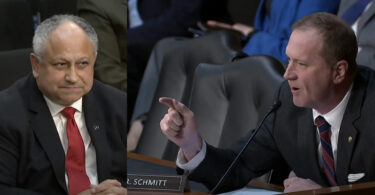All of the military services are currently reworking their policies to adjust separation and promotion records for service members who refused to get the COVID-19 vaccine, after the Pentagon ended the inoculation mandate last month.
The Pentagon directed all the services to “formally rescind any policies, directives, and guidance implementing those vaccination mandates as soon as possible, if they have not already done so,” according to a Friday press release.
The service branches must notify the Pentagon that they’ve made the changes no later than March 17.
The new policy guidance to the services makes no mention of reinstating service members who were separated from the military for refusing the shot.
The same day the Pentagon set the deadline for the services, several of the branches — namely the Army and Air Force — began issuing their guidance, which stated they would remove or correct adverse actions in records related to vaccine refusal.
The Department of the Air Force, which also issues guidance for the Space Force, has detailed it will be rescinding letters of admonishment, counseling or reprimand; records of individual counseling; nonjudicial punishments; and current involuntary discharge proceedings connected to vaccine refusal.
Additionally, “promotion records will be corrected by the [Department of the Air Force] who will remove or redact all adverse actions related to vaccine refusal,” according to a Friday press release.
The Army also announced in a Friday press release that ongoing reviews of COVID vaccine exemption requests, records of soldiers who requested COVID vaccine exemptions, vaccine requirements for accessions or pre-commissioning programs, and travel restrictions based solely on COVID vaccination status will be removed or amended.
The Coast Guard issued guidance Monday announcing it was “taking action to remove” all administrative remark entries related to the COVID-19 vaccination mandate from reserve and active-duty records. Those records are supposed to be cleared by March 31, according to the guidance.
The Navy began issuing guidance to sailors earlier this month. On Feb. 17, the service lifted its policy of banning unvaccinated sailors from deploying.
There are some notable caveats. The policy does allow commanders to “implement Health Protection Measures at any time or manner deemed necessary in support of operational safety and effectiveness.” It also allows them to restrict sailors’ movement “in order to comply with host nation quarantine regulations.”
Similar to the Navy, the Marine Corps is no longer stopping unvaccinated Marines from deployments.
“There are no current COVID-19 vaccine restrictions on deployments or assignments for the Marine Corps as a service,” Capt. Ryan Bruce, a Marine Corps spokesman, told Military.com. “Marines will defer to Combatant Command policies regarding deployments.”
It is not yet clear how the various services will handle pending lawsuits that sprang up in the years following the Pentagon’s COVID-19 vaccine mandate. .
Several lawsuits have been filed by sailors opposing the mandate and challenging the Navy’s approach to reviewing the religious exemption requests. The Supreme Court ruled in March 2022 that the sea service was allowed to reassign sailors who had refused the shot and filed exemption requests to nonoperational commands.
The lawyers for the biggest lawsuit against the service said that, after the Navy’s policy change on deployment, they were “still assessing the impact of this policy on our Navy SEAL clients and more than 4000 class members,” according to a statement released Thursday night.
The suit was initially filed by a group of Navy SEALs but later expanded to include all vaccine-refusing sailors.
Another lawsuit, first filed by troops attached to Wright-Patterson Air Force Base, Ohio, has led to temporary protections for around 10,000 active-duty, Active Reserve, reserve and National Guard members of the Air Force and Space Force who requested a religious exemption from the COVID vaccine, although only those who have been denied an exemption would face immediate action.
A ruling in that case, issued this past November by the 6th Circuit Court of Appeals in Cincinnati, upheld previous wins by attorneys representing the service members over the last year and took aim at the Air Force’s process of approving religious exemptions. The decision sets the stage for a future trial or, possibly, the case winding its way up to the Supreme Court. . . . . . (read more on Military.com)








Leave a Comment